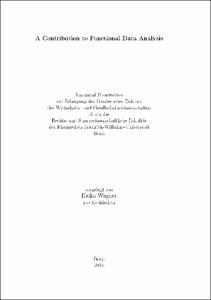A Contribution to Functional Data Analysis

A Contribution to Functional Data Analysis

| dc.contributor.advisor | Kneip, Alois | |
| dc.contributor.author | Wagner, Heiko | |
| dc.date.accessioned | 2020-04-22T18:02:39Z | |
| dc.date.available | 2020-04-22T18:02:39Z | |
| dc.date.issued | 18.11.2016 | |
| dc.identifier.uri | https://hdl.handle.net/20.500.11811/6829 | |
| dc.description.abstract | Functional Principal Component Analysis (FPCA) approximates a sample curve as a linear combination of orthogonal basis functions. It is often possible to describe the essential parts of the variations of functional data by looking only at a usually very small set of principal components and the corresponding principal scores. Two approaches based on FPCA to estimate smooth derivatives of noisy and discretely observed high-dimensional spatial curves are presented. To handle observed data, both approaches rely on local polynomial regressions. The requirements under which the methods are asymptotically equivalent are evaluated. If the curves are contained in a finite-dimensional function space, it is shown that both methods providing better rates of convergence than estimating the curves individually. The methodology is illustrated in a simulation and empirical study, in which state price density (SPD) surfaces from call option prices are estimated. Serious issues deriving to an FPCA decomposition arise in presence of a Registration problem. Registration aims to decompose amplitude and phase variation of samples of curves. Phase variation is captured by warping functions which monotonically transform the domains. Resulting registered curves should then only exhibit amplitude variation. Most existing registration method rely on aligning typical shape features like peaks or valleys to be found in each sample function. It is shown that this is not necessarily an optimal strategy for subsequent statistical data exploration and inference. In this context a major goal is to identify low dimensional linear subspaces of functions that are able to provide accurate approximations of the observed functional data. Problems of identifiability are discussed in detail, and connections to established registration procedures are analyzed. The methodology is applied to simulated and real data for example an analysis of the juggling dataset. Here an elementary landmark registration is used to extract the juggling cycles from the data. The resulting cycles are then registered to functional principal components. After the registration step the focus is then at the functional principal component analysis to explain the amplitude variation of the cycles. More results about the behavior of the juggler's movements of the hand during the juggling trials are obtained by a further investigation of the principal scores. | en |
| dc.language.iso | eng | |
| dc.rights | In Copyright | |
| dc.rights.uri | http://rightsstatements.org/vocab/InC/1.0/ | |
| dc.subject | Dual method | |
| dc.subject | Derivatives | |
| dc.subject | state price densities | |
| dc.subject | Amplitude variation | |
| dc.subject | Genes | |
| dc.subject | Dimension reduction | |
| dc.subject | Functional data analysis | |
| dc.subject | Functional principal components | |
| dc.subject | Low dimensional linear function spaces | |
| dc.subject | Phase variation | |
| dc.subject | Registration | |
| dc.subject | Time warping | |
| dc.subject.ddc | 310 Allgemeine Statistiken | |
| dc.title | A Contribution to Functional Data Analysis | |
| dc.type | Dissertation oder Habilitation | |
| dc.publisher.name | Universitäts- und Landesbibliothek Bonn | |
| dc.publisher.location | Bonn | |
| dc.rights.accessRights | openAccess | |
| dc.identifier.urn | https://nbn-resolving.org/urn:nbn:de:hbz:5-45452 | |
| ulbbn.pubtype | Erstveröffentlichung | |
| ulbbnediss.affiliation.name | Rheinische Friedrich-Wilhelms-Universität Bonn | |
| ulbbnediss.affiliation.location | Bonn | |
| ulbbnediss.thesis.level | Dissertation | |
| ulbbnediss.dissID | 4545 | |
| ulbbnediss.date.accepted | 03.11.2016 | |
| ulbbnediss.institute | Rechts- und Staatswissenschaftliche Fakultät / Fachbereich Wirtschaftswissenschaften : Institut für Finanzmarktökonomie und Statistik (IFS) | |
| ulbbnediss.fakultaet | Rechts- und Staatswissenschaftliche Fakultät | |
| dc.contributor.coReferee | Vogt, Michael |
Files in this item
This item appears in the following Collection(s)
-
E-Dissertationen (288)




